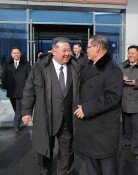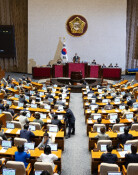U.S. Will No Longer Be Main Export Destination for Asia
U.S. Will No Longer Be Main Export Destination for Asia
Posted May. 11, 2007 07:54,
The U.S. economy is 30 percent likely to experience a slowdown next year. Because of its excessive current accounts deficit, it wont be able to maintain its voracious demand for Asian imports any longer. This year will probably be the last chance for major Asian exporting countries to exploit the American market.
Lawrence H. Summers, president of Harvard University and the former secretary of the Treasury, urged Asian economies with high dependency on American market to brace themselves for a possible economic meltdown in the U.S.
In a special lecture on Thursday at the Samsung Global Investors Conference 2007 hosted by Samsung Securities in Seoul, Summers forecasted that U.S. annual economic growth would stay at a two-percent range for the next one or two years due to plummeting domestic consumption triggered by the recent housing market slump.
With growing concerns about inflation in the U.S. economy, the Federal Reserve Bank (FRB) may raise interest rates further. I agree with former FRB chairman Alan Greenspan, who recently gave a 30 percent chance of an economic slowdown, he added.
He also remarked, The U.S. current trade deficit is at 800 billion dollars (roughly 760 trillion won), which accounts for seven percent of Americas total GDP. With the total amount of its imports two thirds more than that of its exports, the trade imbalance between the U.S. and major exporting countries including China has widened substantially.
If American consumers start to spend less money due to an economic chill, most Asian countries with heavy reliance on the U.S. market may suffer. To be less affected by the decline, he emphasized that Asian exporters must take preventive measures such as reducing their dependence on the U.S. market.
Threatened by Asian economies rapid growth, more American politicians nowadays support trade protectionism and economic nationalism. The next president should be able to maintain an open economic policy while addressing the trade imbalance so that American consumers and companies can gain more competitiveness, he said.
His further remarks included, The U.S. invasion of Iraq has undermined the worlds trust in Americas capabilities and has heightened economic uncertainty. The Bush administration should think about the consequences of its war in Iraq.
Summers served as the Treasury Secretary from 1999 to 2001 in the Clinton administration and as Harvard president from 2001 to 2006.
aryssong@donga.com







